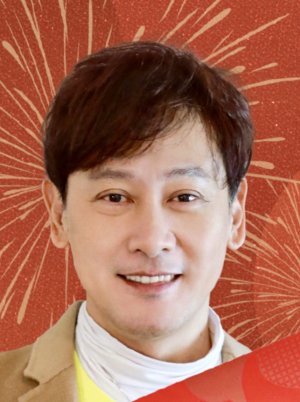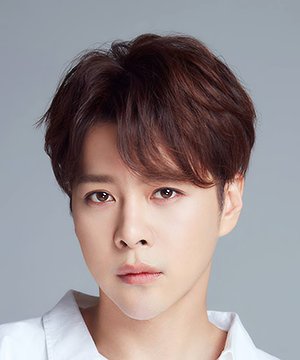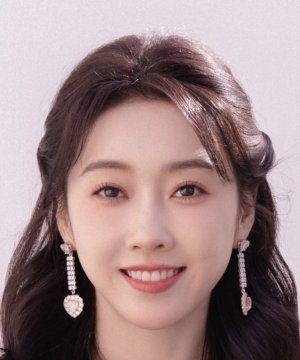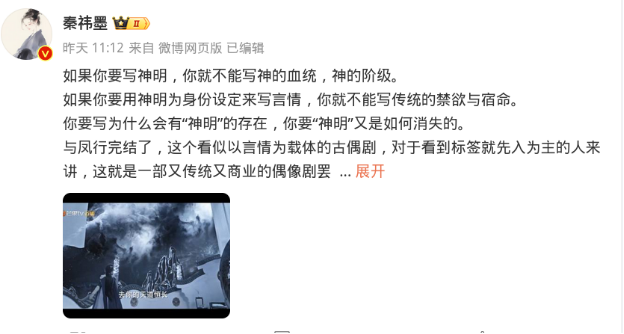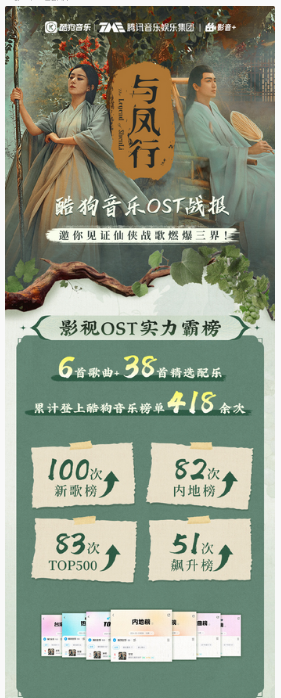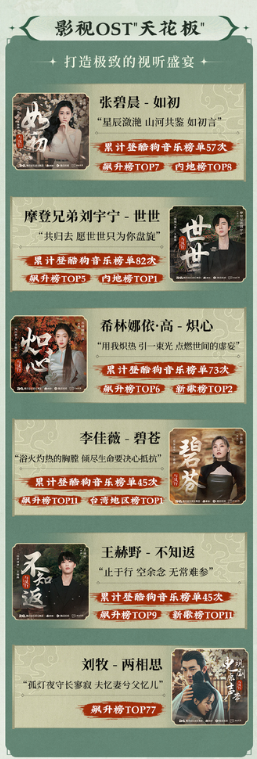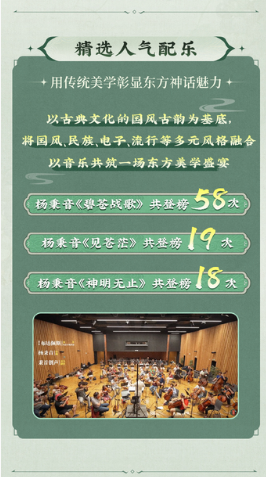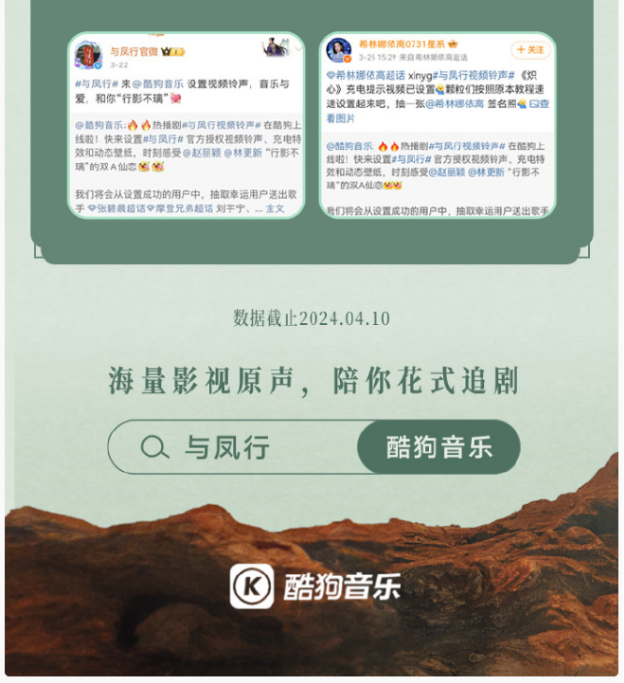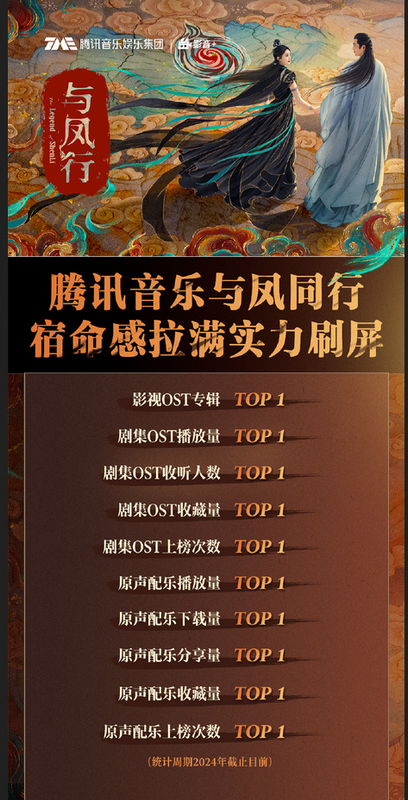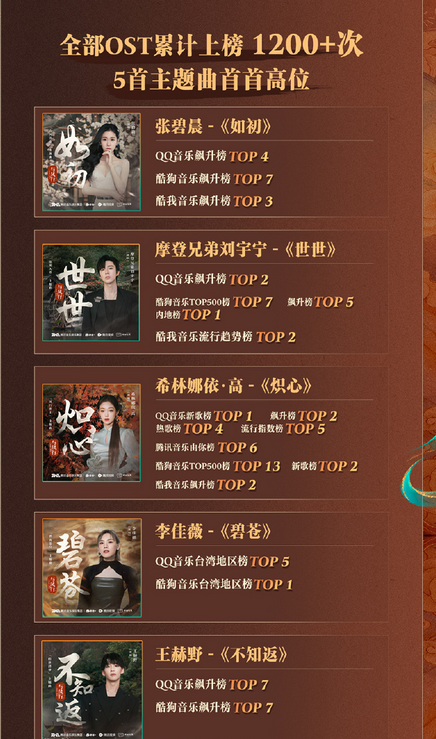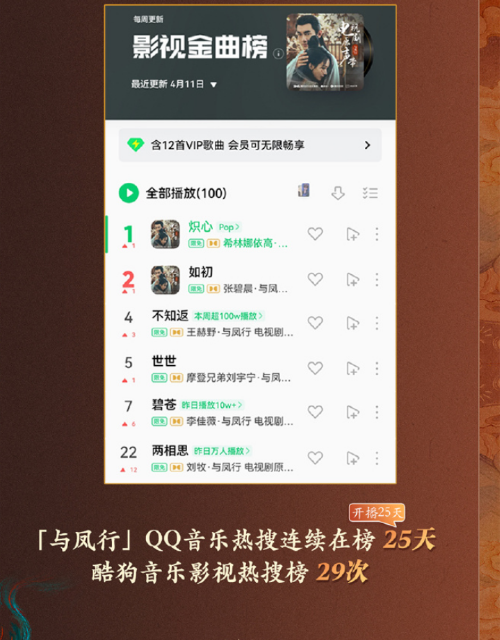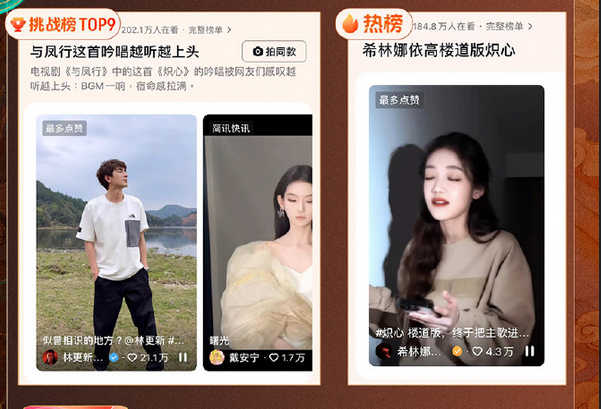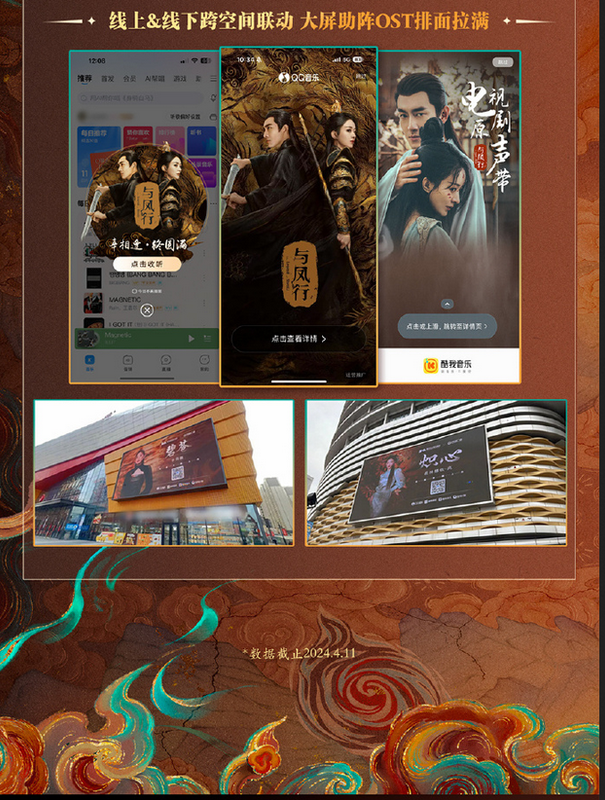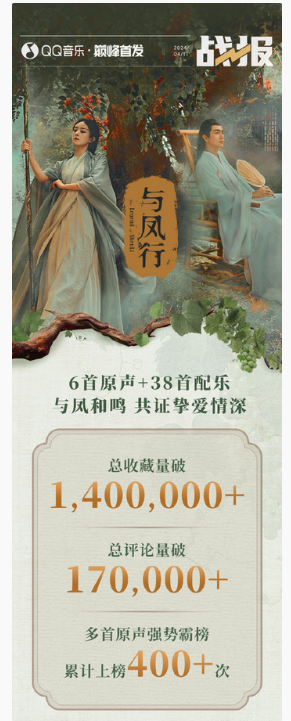From The Past to the Future :Revelations in the Extranatural Heaven books |
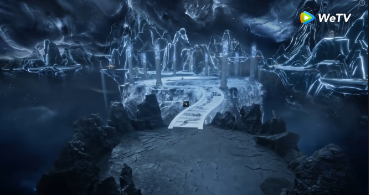 | 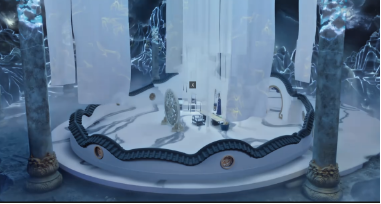 |
| Character | Actor/ Actress |
 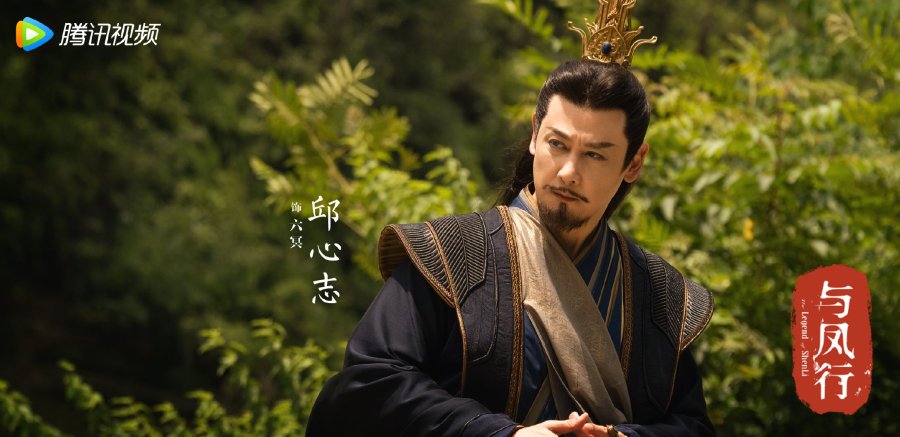 | [10] Liù Míng 六冥 He was the Demon Emperor, Master of Liú Yǔ. He tried to create Chīmèi 魑魅 monsters, claiming it was to help the Immortals to resist the Divine, but he could not control the monstrous creatures. He was also the former master of the Immortal tribe, including of Shěn Mùyuè who led in the Immortal army camp (until she rebelled against his crazy ambitions). Despite he was the father of Mò Fāng he had no care for his son's life, only looking to complete his own "grand plan". (ep.33-36) |
--Fandom Name: 丘比特 Qiūbǐtè ("Cupid" ; 1.92 million fans on Weibo) | ||
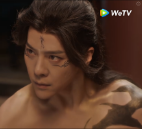  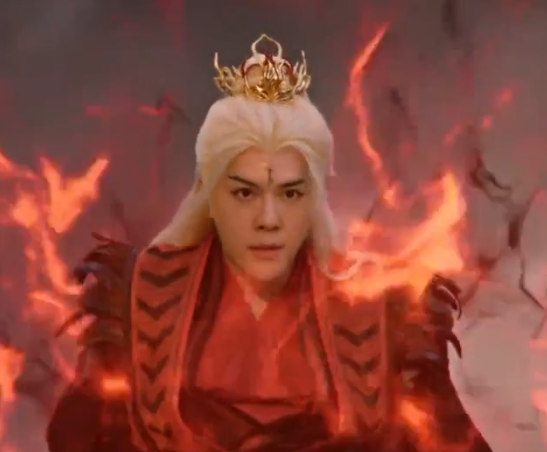 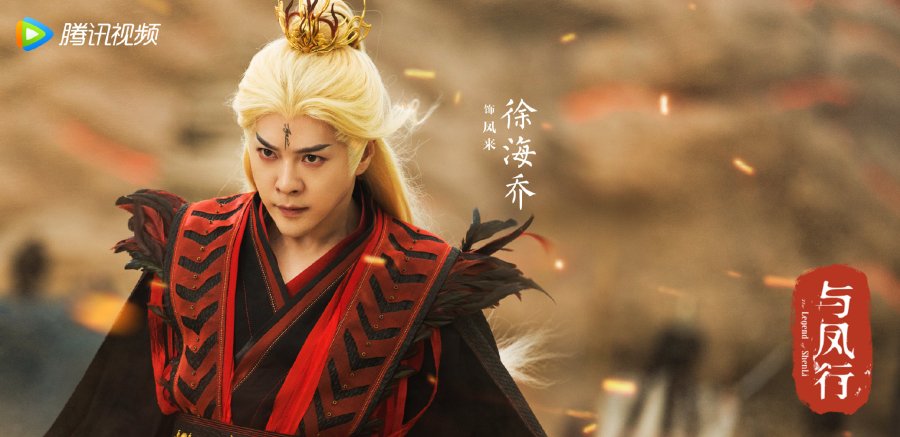 | [63] Fèng Lái 凤来 Shen Li's father, created as "Chīmèi" (魑魅) from a phoenix feather in the Demon King's alchemist oven. He did not want obey the Demon King, refused to kill, and was distressed over the death of a pet dog he and Liú Yǔ raised. But his power of Fire was needed for the Five Elements Seal that Xíng Zhǐ used to create the Abyss, so as to contain the rogue Chimei that threatened Divine and Immortals alike. Which was why they called the God for help. Misled by Liù Míng and enraged by the revelation of Liú Yǔ's death, Fèng Lái attacked and wounded XZ, while only SL remained to stop the Abyss from collapse and freeing all Chimei. SL used her spear to keep the fire barrier up in part, while she flew to prevent Fèng Lái from killing XZ. (ep.33-37) |
--Fandom Name: Hǎi bǎo 海宝 ("Sea treasure") ; 12.1 million fans on Weibo. |
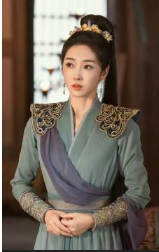 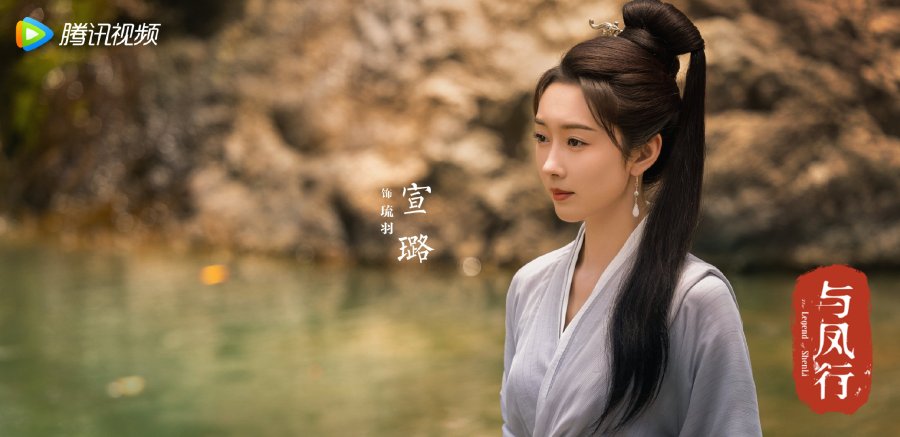 | [9] Liú Yǔ 琉羽 She was Shěn Mùyuè's younger sister and Shěn Lí’s mother. She had named and offered to take care of and teach the unusual humanoid Chīmèi in order for him to become the King of Chīmèi under Liù Míng. When Liù Míng wanted to force Fèng Lái to kill people, injuring him, she fled with him to hide in Mortal Realm. When she gave birth to SL, she replaced SL's fiery inner core by her own, to protect her in her youth, and handed to her sister the fiery "bead" (which she named the "Azure Sea Pearl" Bìhǎi Cāng zhū 碧海苍珠 as a wish that the child would sail freely the vast ocean of life) . She entrusted SL to Shěn Mùyuè, who would act as surrogate mother to the girl, after her death. (ep.33-34) |
--Fandom name : 露水 (Lù Shuǐ, "Dew"), 11.75 million fans on Weibo | ||
This "illustrated portrait gallery" of the protagonists by order of appearance, with precision of which episodes they appear in (screenshot pictures also lead to relevant episode on WeTV) does not take into account non identified or too short roles. Although with some exceptions (like Shen Li's maid in Divine Realm [47] , the mermaid [58] and the children/Koi carp spirits [48]), the two remarkable cameos of the drama director (playing as the Chicken Seller) [13] and the drama's art director Zhào Yǔ 赵宇, (playing as Meat stall boss 肉摊老板 [13.1].
So, here are some I left out :
- the other traders on Qingsheng market in the first episodes such as
- the father of Zhōu Sān Láng,
- "Zhōu Dàláng" 周大郎 , played by Lǐ Hóngquán (李洪权) who tried to restrain his grieving daughter-in -law from pestering Xing Yún, in ep.2
- the Gù family head and personnel in eps.3-6 :
- "old Xing Yún" 老年行云 , played by Yù Qìnghuī (喻庆辉) in a glimpse until he vanished in the mist ;
- the soldiers of the Immortal army (anyway, the "Immortal Realm Soldier", mentioned by dramawiki list as played by Guō Jiāqí (郭嘉琦), is not on Baidu) ;
- the guards in Divine Realm :
- "Heavenly Emperor's attendant" 天君侍官 played by Liú Yǔzé (刘宇泽)
- "Guard of Nan Tian Gate" 南天门守卫 played by Kǒng Yǔchōng (孔宇翀) ;
- the old gods that were glimpsed in the peeks into Xing Zhi's youth and past ;
- the couple who was having a wedding, when Shen Li passed by their house on her revisiting Qingsheng : Jiáo Fū's sons 樵夫儿子 (x2) and new daughter-in-law 樵夫儿媳, played respectively by Sū Zhènhuá (苏振华), Lín Chén (林晨), and Cuī Yíng(崔莹) in ep.14 ;
- the Mortal realm lesser immortals/gods and followers of Hú Lù, in eps.6, 14-15 :
- "young Earth Immortal" 青年地仙 played by Zhāng Xǐlái (张喜来)
- "Earth Immortal Lady" 地仙妙龄少女 played by Jiān Wén Wén (菅雯雯)
- the traders/sect members who were seeking help from the Golden Lady. ep.38-39
- some who were not clearly identified by me in the drama or remained anonymous :
- Hán Lùjǐn (韩录锦) as Madame Wang 王娘子 (Golden Lady's attendant?)
- Jìn Bāngyī (靳邦壹) as Zhāng Yáng 张扬
- Mǎ Xù (马旭) as Lù Yuǎn 陆远
- Wú Tiānháo (吴添豪) as Liú Zhāng 刘章
- Lóu Qīng (娄清) as Shěn Lí (imaginary) 想象中沈璃
- Lín Shǎoyáng (林少阳) -- no clue! He is not in the Baidu List
- Bó Lái (铂莱) child actress - not in the Baidu list - (perhaps the child who fell and was protected by Mù Zi Chún)
- Lǐ Qiàn Fēng (李干锋) listed as "Devine Realm soldier" on MDL but appearing neither in Baidu nor on dramawiki lists.
- Mǎ Míngyǔ (马明宇) listed as "Liang Wei Ping" on MDL, but appearing neither in Baidu nor on dramawiki lists.
Some of those are listed on the dramawiki cast list, some on MDL, but not all are on the Chinese Baidu list (those who are get their character names in Chinese characters). But even the Baidu list, inexplicably, forgot at least one significant protagonist who is also famous enough as an actor/singer to have been spotted by those familiar with dramas, music, or variety shows : Mù Zi Chún (played by Zhōu Jùnwěi ). If you spot a familiar face, which you think should be added to list, feel free to do so in comments !
This part and section of Characters gallery completed and last revised on 2024-04-07
5. Xianxia Gods and Fate - some thoughts |
This drama has to my mind very interesting messages about what the Gods/Immortals/Demons/Fairy Worlds/Mortals/Ghosts etc are about in the Chinese xianxia and related context.
I had already expressed that feeling in my comment of 2024-04-06 when I wrote :
"Episode 39 and the "surprised expression" of Xing Zhi in the end was so entertaining.
 I enjoyed this xianxia very much, thrilled to see that it got over 100 million views lately, to share in the excitement. Lady Jin had been missed, but we did get to see her, tying in with a very nice finale ! The core was important, but not so much that it couldn't be lived without. Finally, the time of the gods ended but not our favorites', to enjoy peace and love, and mischief, that added spice, after all the pain they'd gone through.
I enjoyed this xianxia very much, thrilled to see that it got over 100 million views lately, to share in the excitement. Lady Jin had been missed, but we did get to see her, tying in with a very nice finale ! The core was important, but not so much that it couldn't be lived without. Finally, the time of the gods ended but not our favorites', to enjoy peace and love, and mischief, that added spice, after all the pain they'd gone through.
Sometimes, deep reflections and thoughts were proffered : are gods still needed in our new age ? Do they need to be violently killed or cremated, or can they just retire and live for themselves ? Can those who have been put into power and accepted the duties, always be up to their tasks ?
I liked that the drama was a soft romance too, satisfying if not of the steamy sort, and that the marriage question was shown as not that necessary, as a political or society requirement, but just as a cherry on top of the cake, sealing the union in less flamboyant way as sealing an Abyss, but leaving room for sparks and continued slow burn but long lasting fire. This viral message to those who still see marriage as needed at a certain age, with desirable or not age gap, and body appearance in terms of height, roundness of face or filling the clothes as well as the shoes.
The God walking bare feet on the shards was one striking moment to show how despair and depression can hit even those that are relied on, taking them for granted, watching their moves and judging behaviors from below.
 Shen Li discovering Xing Zhi's depressed past, from ep.33
Shen Li discovering Xing Zhi's depressed past, from ep.33
This drama actually went further than only pure entertainment."
MDL user Kar made a meaningful comment that I can't resist singling out to copy below.
"If you want to write about gods, you can't write about the bloodline and class of gods. |
back to Table of Contents Last edited 2024-04-07
Netnet:
By the way, those lines said by Kar were actually translated by them from a chinese user who posted a meaningful message about the drama on weibo!
Thanks, so they are from that Weibo post? Thank you for having found it and pointed it out, and to Kar for having translated the beginning. Anyway, it was worth quoting , so worth translating. Copying the original below, for those who read Chinese :) The comments to that post, in Chinese are also interesting to read there !
I added some Gif to illustrate what I meant by the fatigue of gods, and people who are expected to be flawless leaders or rulers. We live in an age where Gods are not revered by all, but where everything is acknowledged as illusions, including the faith of those who enter sects or blindly follow those who claim they know what the meaning of life and the afterlife is... (Presently watching the last episodes of "War of Faith" which is about other, more modern, forms of clash of beliefs and illusions.:)
| 如果你要写神明,你就不能写神的血统,神的阶级。 如果你要用神明为身份设定来写言情,你就不能写传统的禁欲与宿命。 你要写为什么会有“神明”的存在,你要“神明”又是如何消失的。 与凤行完结了,这个看似以言情为载体的古偶剧,对于看到标签就先入为主的人来讲,这就是一部又传统又商业的偶像剧罢了。 但这完全无法解释与凤行的播出效果,更不能解释站到了今天高度的赵丽颖,为什么会选择又接一部古偶并监制。 有些东西,在不起眼的地方,能说服她的,是故事真正的内核。 有些你不曾注意到的内核。 与凤行本质上是一个弑神的故事,在故事的结尾,最后的上古神行止坠落,天外天和墟天渊消失,神的使命终结。 如果你曾被行止那无比酷炫的镜头所震撼,为行止的神坠而哭泣,我想请你把视线稍微转移到旁边,移到那个看似并不酷炫的沈璃身上。 来讲讲,为什么这是一个神坠,又不仅仅是神坠的故事。 神明的认知和民族文化里最原始的宗教信仰紧密相连的。在历史上,中国人以神仙为载体创作了许多故事,从创世神到后来的仙人传奇,每个中国人或多或少都看过一些。 那么你发现吗?中国人是不允许神格凌驾于人格之上的。 在宗教一脉历史上,从神,到仙,各方的创作构建起了一个和人界平行存在的其他领域。有些称三界,有些称六界。从本土原始宗教到后来的道教与传入的佛教,都对神仙类的文艺创作有非常大的影响。 总的来讲这些故事都有一个显著特点:神,是要干活的。创世神开辟了这个世界,给了我们文明的活动空间,神之后有了仙,不管是天生的仙还是修道成仙的凡人,到了仙界他们还是要干活的,他们要为了人界的稳定发展而干活。管风雨,管日照,管收成,管财富。 于是你再来看行止的诞生。为什么会有上古神?基于仙界的无脑崇拜,不难看出在与凤行的世界观里,上古神的诞生并被赋予了强大的力量,本质上是用来维持三界平衡的。这有点接近于中国本土文化里,对于最原始创世神的概念设定。 然而与凤行的故事最大的妙处在于,这个故事是来颠覆行止的,并且颠覆的很合理。 将三界的力量系于一个人(哪怕这个人是神明),都是巨大的压力。人类对神明的想象来自自身欲望的延展,理解神明不要用宗教崇拜,而要从人的角度去理解“神明”在文艺作品里的存在。 【备注:“神话乃是对以欲望为限度的行动的模仿,这种模仿是以隐喻的姓氏出现的,换言之,神的为所欲为的超人性只是人类欲望的隐喻表现”——参见叶舒宪编《神化——原型批评》中引用诺思洛普·弗莱的话】 基于这个视角不难发现,天道铸造神明去掌控巨大的力量,这种力量基于不合理的分配势必带来秩序的混乱,由此诞生了灵界六冥铸造魑魅去妄图颠覆的行动。 行止一千年前封印魑魅铸造墟天渊,让灵界饱受墟天渊带来的负面效应影响。所有人都会认为神明的行为是没有问题的,他这么做一定是最合理的。 如果真的是这样,那一千年后为什么又会为了沈璃而选择让天外天与墟天渊一同终结? 巨大的力量在一个人手里,这势必会带来私心。天道诞生行止的时候没有交代使命,那么行止的使命就是终结绝对力量对三界的影响。 一千年前他没有以牺牲自己为代价终结,一千年后他选择为了沈璃而终结。 因为巨大的力量诞生随之赋予的使命,对于一个有着七情六欲却没有经历过的神明(人)来讲,是残忍的。 仙界呼喊着三界安危,但若不懂爱一人,如何爱三界? 沈璃没有出现之前,行止是被动的履行使命去保护三界。那么沈璃出现,行止就懂爱了?如果这么简单,那这部剧就叫行止传奇,而不是与凤行了。 与行止神坠的同时,是属于沈璃(也是人性)中神性的诞生。 明面上的“神坠”带来的是不属于三界的绝对力量消失,与此同时能让三界继续归于平稳的,是每个人自己“神性”的诞生。 这第一个诞生的,是沈璃。而且还是那个如果算上身份政治,绝对不可能的沈璃。 作为魑魅之王的女儿,她的出生伴随着保护于磨砺的开始。她的父亲凤来就是六冥为了颠覆天道而创造出来的失控力量,她的母亲琉羽则是绝对爱的力量。 是琉羽教会了凤来爱苍生,所以魑魅之王没有失控。是绝对母爱琉羽坚持生下沈璃,交给师姐沈木月照看,才有了后来足以改变三界的沈璃。 若以身份论优劣,沈璃从一开始就会被绝对歧视。然而在爱的保护下长大的她,比行止更早,更成熟的懂如何爱人,爱苍生。 这也是为什么与凤行后半部分行止发疯失控的时候,你不会厌恶行止的原因。 因为沈璃在,她不会允许行止因为自己,而忘记责任。 与凤行是言情,是古偶,但是她写了一个爱与责任皆不可放弃的存在。 我想,这才是最终能打动赵丽颖真正的所在。 说起来沈璃又是从什么时候打动行止的呢? 故事的开始,人间小院的时候,还是行云的行止,给了沈璃从未有过的家的感觉。 谈不上爱与不爱,凡人和灵界超长的寿命是不可比的,对于行云,沈璃一开始便是点到为止。 大概就是那句“有我在,你不会死的”慷慨许诺,开始在行止的内心荡起涟漪。 一个生来就为了守护苍生而存在的神明,第一次被一个实际力量不如自己的姑娘保护在身后。千万年来孤独寂冷的行止,又如何能控制得住? 爱情不是程序设定,而是真正的心动。 第一次分离,五百年灵力说给就给,从那时起行止就明白了她的身世。 换句话说从那时起,行止就知道天道终结的这一日,必将到来。 可即便如此,那么喜欢行云的沈璃,在得知行止的身份以后也从没有逾越雷池一步。沈璃对于苍生的责任感,比行止来的更鲜活,更有原则。 话虽如此,在符生偷摸发动对仙界进攻的时候,沈璃却还是第一个飞回西苑保护神界灵位的那个人。 那一场戏行止是多么的耀眼,神明的力量是绝对的强大,一会袖子所有的碎石都被抛了回去。 可你记得吗?那场戏,是沈璃知道即便自己不如神明力量强大的那一刻,依然挺身而出保护了灵位。 为什么? 沈璃不是神,但她敢把神明行止护在羽翼之下。 哪怕只是一圈灵位,但她知道那是你最后的念想。 沈璃用行动展现了神性,非天道所铸,却来自人的本能。 有沈璃如此,这三界何须行止? 行止自己也很清楚,他霸道的守着她,但没有折断她的羽翼,而是耐心的帮她修复。 从那时候起,他就知道自己的结局。 与凤行的故事真正的内核,在神性的叙事上。 明面上将行止写的无比耀眼,然而实际上,能改变一切的,却是来自沈璃骨子里本能的爱苍生的力量。 是这股力量,让行止明白了爱一人放知如何爱苍生。 也是这股力量,不偏不倚的写清楚了什么是爱情。 与凤行,不是小凤凰沈璃被行止爱上的过程,而是上古神行止逆天而动求来的同行。 最后同死那一刻,大概是行止最快乐的时候。 凤来救了沈璃,琉羽骨子里爱苍生的本能,改变了这一切,却也无法改变行止使命终结带来的死亡命运。 不过这里我又要说了,别看大结局九鹭非香把行止又写活了。 这不是单纯的撒糖,这骨子里还是中国人逆天改命的本能。为三界牺牲的行止,为三界失去爱人的沈璃,为什么不能拥有一个完美的结局? 写活行止骨子里是对天道的反叛,既然赋予上古神绝对力量,那天道也没那么狠心。 神明行止不在了,但陪着沈璃的爱人行止,又妨碍天道什么呢? 逆天改命的同时,不要忘了自己的使命,才是与凤行的故事。 明面上弑神,实际上写人的神性,才是作者对于这个故事创造的最大的闪光点。 我想,这也是最后能说服赵丽颖的点。 古偶仙侠并不可怕,不是说商业剧就是套路,就是复制,就是无脑。 商业剧可以轻松,但轻松的本质是要明白现在当下的观众到底吃什么。 在这个时代,谁还写爱情至上,这种古典主义是真的会被人骂死,但你写清楚了爱与责任,这就真的很好磕了。 #与凤行三界茶话会# |
6. The 天外天 EXTRANATURAL HEAVEN CONCEPT |
I was debating in comments about how this concept, in the way it was visually translated, evoked different things, "space", the "Milky Way" or something else...
 The creation of the Milky Way, painting by Guo Xu 郭诩 (1456-1532)
The creation of the Milky Way, painting by Guo Xu 郭诩 (1456-1532)
 Wang Hui 王翚 (1632-1717) master of landscape paintings from Suzhou. Wang Hui 王翚 (1632-1717) master of landscape paintings from Suzhou.Traditional Chinese ink painting, Shui-mo (水墨) is closely tied to Taoist and Confucian philosophy, valuing simplicity and harmony with nature. It goes back to Tang (618-907) and Song Dynasty (960-1279) art & poems. |  Yang Yongliang 杨泳梁 (b.198, Shanghai), Sleepless Wonderland, 2012 Yang Yongliang 杨泳梁 (b.198, Shanghai), Sleepless Wonderland, 2012 This painting "the silent valley" reminds me of the style used in TLoSL Extranatural Heaven landscape. (click on painting for info about the contemporary artist) Shi Weili 石伟力 , digital painter of Shanshui in the World, 2016, made an short film explaining what he meant and the relevance of shanshui in the 21st century. |
 Cai Jingxing 蔡景星 (b. 1924) West Lake -- misty mountains rising over the void in the distance.
Cai Jingxing 蔡景星 (b. 1924) West Lake -- misty mountains rising over the void in the distance.
To me, The Legend of Shenli's Extranatural Heaven looked like the world view of traditional shanshui Chinese landscape paintings, with the void between lower planes and more lofty ones. It was reinforced by the black (ink) and white colors, the brush Xing Zhi used to "repair" the falling heavens, on the large scroll painting with colors. I felt a connection between the painting action and the "world building actions" that creative artists, plastic or literary, use to gift us with the fruit of their imagination. Behind creative process, there's always a mystery (despite some may reduce it to "reasons") which link it to the arcane. In Chinese lore, there are also scrolls with cryptic, magic messages, like in the Yi Jing which are to be used by the action of throwing objects as one could throw spells. Xianxia being a godchild of Daoism, encompassing other faiths and views like old folk religion and Buddhism, and the cycling between various forms and planes of existence of souls (or soul shards that must be reunited), the action of painting and unfolding scrolls, the talk about stars that might be picked, seemed symbolic of the importance of "higher powers", and magic. The Milky Way is indeed important in Chinese myths, so there may have been some influence for the set and CGI design, there.
Xianxia being a godchild of Daoism, encompassing other faiths and views like old folk religion and Buddhism, and the cycling between various forms and planes of existence of souls (or soul shards that must be reunited), the action of painting and unfolding scrolls, the talk about stars that might be picked, seemed symbolic of the importance of "higher powers", and magic. The Milky Way is indeed important in Chinese myths, so there may have been some influence for the set and CGI design, there.
 Shen Li discovering Xing Zhi's painful loneliness (ep.33)
Shen Li discovering Xing Zhi's painful loneliness (ep.33)
But in the "Beyond heaven" depiction, Xing Zhi being seated on a round flat plane with void around, and in the distance, a sketchy peaks-barrier like veils hanging from nowhere, fluidly showing a sort of crumbling and rewinding : all that was rather removed from my notion of the void of interstellar deep space. I viewed it more like symbolic of a magical, unfathomable, removed, vision or "plane" where the power of the mind could create at will, such as the walls Xing Zhi put around Shen Li, or the wine that lonely Xing Zhi drank, the shards he walked on to get at least a feeling of pain against the depressing numbness and void.
 Xing Zhi and Shen Li rebelling against the Natural Law (ep.36-37)
Xing Zhi and Shen Li rebelling against the Natural Law (ep.36-37)
It could also be in modern worldview, an alternate or parallel universes in the string theory where energy might create the tools to build and act.
 From "Everything, Everywhere, All At Once", the movie - The many alternate strands of the universe, including that of the talking stones, which evoke to me the stone from which the Monkey King was born. From "Everything, Everywhere, All At Once", the movie - The many alternate strands of the universe, including that of the talking stones, which evoke to me the stone from which the Monkey King was born. |
From arts, pictorial, plastic, or alchemist, to science : action is the link and the cause of cycles, ancient or renewed, and finally, we end up wondering where and how freedom can arise, since cycles when "broken", are merely replaced by other ones...
This xianxia can induce quite a few philosophical thoughts ! 🤣
MORE ABOUT THE THREE DAOIST REALMS
Note: Dao is the preferred spelling from Chinese pinyin transliteration, but Tao, the other spelling from the Wade-Giles transliteration based on English, is equivalent.
There are 3 Realms in Daoism, which are not exactly the same as the 6 ones in Buddhism.
About the division into "Realms" and the link to Daoism and Buddhism, there was a debate about whether xianxia only operated a simplification of the "6 realms" of Buddhism. It is not that simple!
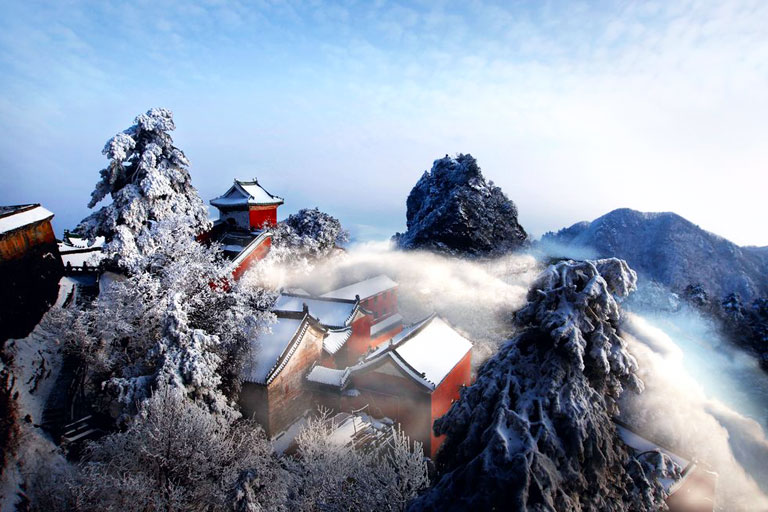 Wudanghan Wudanghan |

In various Chinese religions and philosophies, the Tao or Dao 道 is the natural way of the formless universe, so the "Natural Law" transcends and is above everything. It is "unknowable", "a flow" which should be followed instead of resisted (concept of " Wu Wei 无为 "- not doing or rather, "effortless action"). There are also the Yin 阴 and the Yang 阳, which are the dual moving principles (dark/light, female/male...) that "make the world go round" (but are not much thought of in Buddhism). This is mirrored in the Yi Jing 易經 , a mysterious text, which appeared as a divination manual even before the time of Lao Zi ("founder of Daoism") and Confucius. The Yi JIng or "Book of Changes" is as a series of oracle like short poems, that are meant to bring understanding for those who know how to use them through certain techniques (throwing lots with coins or straws to form hexagrams: these are linked to yin and yang and Wu Xing.). The Yi Jing is different from the Daodejing 道德经, the canon fundamental text of Daoism, which contains allegories,metaphors, stories, that are meant to teach rulers. To this should be added the Zhuangzi 莊子 a collection of poems, essays, and srories named after its author. And the Neiye 內業 (probably older text, that influenced the Daodejing and Zhuangzi, it focuses on techniques for the "qi", vital energy).
Whereas the Buddhist have a division into 6 realms for "ascending" to "nirvana", the Daoist view it differently, with "3 realms" (三界 Sanjie ) which are :
- the World of Desire ( 欲界 Yujie ),
- the World of Form ( 色界 Sejie ),
- the World of Formlessness ( 無色界 Wusejie )
These encompass different forms of Heavens, so if not numbering 99 like mentioned by Tianjun in TLoSL, there still are 36 identified. There are 9 levels ( 九壘 Jiulei ), each can further de divided into four Realms, for a total of 36 Heavens ; 35 of those are part of the Great Overarching Heaven (大羅天 Daluo Tian ). The Great Overarching Heaven is infinite, while other heavens are all finite. It is the highest heaven, transcends all the other heavens, and has no limits. In space, the universe is infinite. In conclusion, the "Natural Law", over the Extranatural Heaven (天外天tianwaitian) is another name for the Great Overarching Heaven( 大羅天 Daluo Tian ).
In these heavens there is a Primeval Lord of Heaven ( 元始天尊 Yuan Shi Tian Zun ) who is one of the highest divinities of Daoism. This patriarch (who was Pangu 盤古 the creator who separated heaven and earth before becoming the ruler of Heavens) lives in the middle position of the upper first rank, i.e., in the Jade Clarity Realm ( 玉清境 Yu Qing Jing ). Living higher than the other thirty-five heavens, the Primeval Lord of Heaven occupies the highest position in Heaven. In the Jade Clarity Realm, there are pavilions of purple clouds and mansions of green clouds. All the immortals duly go to the Jade Clarity Realm to pay respect to the Primeval Lord of Heaven.
Outside the heavens, there is the Netherworld , which is "is dark and obscure. It cannot be entered by common people, but the soul of the dead must inevitably go there, unless it has become an Immortal. The Chinese call the place where the souls of the dead go 'Supreme Yin' ( 太陰 Taiyin ). The netherworld is governed by the Five Kings of Hell ( 五嶽 Wuyu ), especially by the Spirit of the Eastern Hell of Mt. Tai ( 東嶽泰山之神 Dongyu Taishan Zhi Shen ). It is also said that the netherworld is governed by the Great Emperor of Fengdu ( 酆都大帝 Fengdu Dadi ). The netherworld is where the souls of sinners are locked up, as well as ghosts and goblins. "
More info on these pages published by the Daoist database, and on this other page, by a Daoist association.
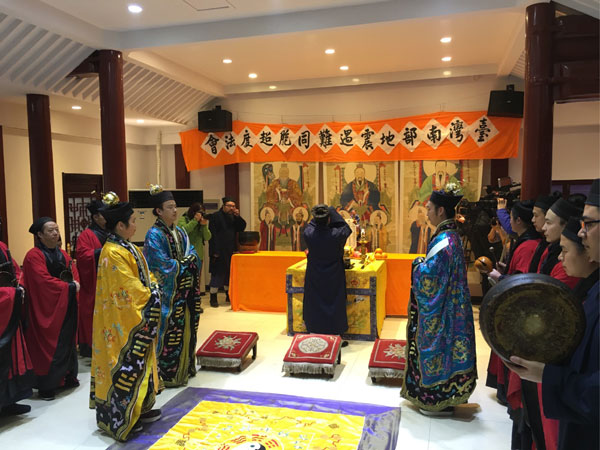
There is a Chinese Daoist Association which speaks for the various daoist sects. The Daoist priests and monks robes are more colorful and varied than the Buddhist saffron colored robes. They also wear different headwear (mostly to keep in order their long hair, because Daoists don't shave their heads, contrary to Buddhist monks). The Wudang Daoists taiji quan (martial arts) practitioners usually wear black or white clothes, white covering on lower legs and characteristic black shoes that lace up on lower leg.
BUDDHIST 6 Realms :
In Buddhism, there are six levels that make up the possible range of existence within saṃsāra. These are the realms of the gods (deva), the demi-gods (asura), humans (manuṣa), animals (tiryak), hungry ghosts (preta) and hell denizens (naraka). These concepts draw their source from sanskrit texts, the sutras, which are themselves derived from the rich Hinduist lore and texts (Vedas, Bhagavad Gita...) so some of the words have been translated into Chinese in the process of bringing Buddhism to China (*)
The realms (or state of existence) of hell, hungry spirits, animals, asuras, human beings, and heavenly beings are another way to refer to the "6 paths" 六道 (*) possible to be followed by a being going through life and rebirth in the process of transmigration. Buddhist cosmology typically identifies six realms of rebirth and existence: gods, demi-gods, humans, animals, hungry ghosts and hells that are mirrored in the six paths that disciples may follow. Liùdào 六道 means 6 paths : Ghost 鬼 /饿鬼 [è guǐ], Asura 罗/阿修罗 [āxiū luó] , Hell 狱/地狱 [dìyù] , Heaven 天/天堂 [tiāntáng] , Human 人 [rén], and Beast 畜/畜生 [chùsheng ]. Among these, there are "evil paths" (hell, hungry spirits and animals) which all represent conditions of suffering, they are collectively known as the “three evil paths.
|
The living being can next ascend to the 6 heavens, which are : , in ascending order, the Heaven of the Four Heavenly Kings, the Heaven of the Thirty-three Gods, the Yāma Heaven, the Tushita Heaven, the Heaven of Enjoying the Conjured, and the Heaven of Freely Enjoying Things Conjured by Others.
Another way to view this possible ascension (through enlightenment) of the journey of the soul, is taking a path to worlds which are, in ascending order of the degree of free will, compassion and happiness one feels, the worlds of: (1) hell, (2) hungry spirits, (3) animals, (4) asuras, (5) human beings (6) heavenly beings, (7) voice-hearers, (8) cause-awakened ones, (9) bodhisattvas, and (10) Buddhas.
Although there is a lot of overlap between Daoism and Buddhism, which both look to "cultivate" through meditation (mostly Buddhist) or exercices (mostly Daoist), and improving in view of "ascension", the path of the "dao" is not exactly the same as the different paths of the buddhists. The Daoists have a strong emphasis on the role of the "qi" (breath") both for health reasons and for following the dao. The Buddhists have come to a similar view, but the practice of qigong is different : The main emphasis of Buddhist Qìgōng is on becoming a Buddha, while Daoist Qìgōng focuses on longevity, enlightenment, and spiritual immortality. Both types are linked to martial arts which have sect-like characteristics and differences: Shaolin is Buddhist, Wudangshan is Daoist.
Since everything cannot be totally explained without over-simplifying and missing something, it is better to just view this as an introduction, to dig deeper into, if interested. I am far from a specialist, although I have "drunk a lot of ink" and dabbled with a lot of things, including baduanjin qigong in Wudangshan!
back to Table of Contents This page added 2024-04-09
From Weibo, a long webposter (one of a series, see also this one ) about the OST :
and another one :
+a 3rd :
Click on pictures to access the full posters which you can view more clearly in detail.
7. GOODBYE TO SHEN LI |
(GIF excerpt from the variety show "Seeking Treasure: The Legend of Shen Li") :

From Marcus Here! Ep.821 of April 17, (timestamp 6:26 to 8:02) screenshots of the reporting of Shen Li farewells :
Link to the audio message of Zhao Liying on April 13, 2024 (2'46).
Text of the Weibo message left by Lin Gengxin on April 11, 2024 :
 好快啊,今天就结束了。记忆拉回两年前,刚进组的时候感觉老亲切了,熟悉的人,熟悉的制作团队。所有的拍摄过程都很开心,每天和大家玩玩闹闹的,一起工作一起玩,真的老舒服了。是的,杀青的那天,我哭了,哇哇哭,现在回想,还挺难忘的,其实还是不舍,舍不得这个角色的结束,舍不得和大家说再见。 好快啊,今天就结束了。记忆拉回两年前,刚进组的时候感觉老亲切了,熟悉的人,熟悉的制作团队。所有的拍摄过程都很开心,每天和大家玩玩闹闹的,一起工作一起玩,真的老舒服了。是的,杀青的那天,我哭了,哇哇哭,现在回想,还挺难忘的,其实还是不舍,舍不得这个角色的结束,舍不得和大家说再见。我的行云:你啊,就是个小菜狗,没钱没势的谁都能踩两脚。但是我知道,你喜欢小院的生活,喜欢落日阳光的安宁,喜欢小桥流水的平淡,喜欢收集落叶的浪漫,喜欢闲云野鹤的生活。你自由,肆意,过着你满足的生活。如果没有那个人的闯入,你的结局会怎样,会不会平淡的过完这辈子。但是,云子,我知道你遇到她,你不后悔,你喜欢她的光芒,你希望有这样不平凡的人生。希望你之后也可以过你向往过的生活。 PS:你厨艺真的不错,是我的榜样,向你学习。 我的行止:我的神君,守护三界辛苦了(费老鼻子劲了)。人人称你为神君,受千人敬仰,万人膜拜。可却也是人人把你架在道德的高地,你无法遵循内心的想法,无人知道你内心的苦。你明明向往自由的生活,但是天道注定是你的枷锁。好友一个个的离你而去,你的寂寞无人懂。三界苍生需要你保护,你肩上的压力无人能分担。你心里的酸涩无人倾诉。我同情你的处境,想要带你走出困境,却也好像无能为力。好在你也很勇敢,你敢于与天道抗争,敢于守护自己的内心。你护的住三界苍生,也护的住内心所爱。真的佩服你!希望你之后都可以和相爱的人相守一生,过自己想过的生活。 我林更新能与二位交手,是我的幸事。 时光一眨眼就这么匆匆溜了,在一起相处的时光仿佛还在眼前。感谢邓导@邓科导演 对我的信任以及在拍摄期间对我的帮助,在表演上给了我很大的发挥空间;感谢赵老师@赵丽颖 在拍摄时也给了我很大的信心,小小身躯的你总是充满能量,这一点真是令人无比佩服,与你搭档是我的荣幸。还有《与凤行》剧组所有演员朋友们,感谢大家的精彩演绎,是大家成就了这部剧。还有剧组全体幕后工作人员们,感谢你们的辛苦付出,期待与你们再合作。 最后我要感谢我自己和每一位支持我的Kids们。谢谢你们一直不离不弃的支持我,不断的给我鼓励和信心。你们的爱我全部收到,以后也会带着你们的这份鼓励继续前行! 这次是真的要说再见了 愿我们在今后的日子 时时挂念,刻刻相逢 再见行云 再见行止 再见《与凤行》  |
Translation:
"So fast, it was over, today. The memory goes back to two years ago. When I first joined the group, I felt so familiar, with familiar people and a familiar production team. All the filming process was very happy. I had fun with everyone every day, worked and played together. It was really comfortable. Yes, I cried on the day when filming was finalized. I cried a lot. Looking back now, it was quite unforgettable. In fact, I was reluctant to let go. I couldn’t bear to see the end of this character and say goodbye to everyone.
About Xingyun: You were just so worthless, could step on those without money or power. But I know that you liked the life in the small courtyard, the tranquility of the setting sun, the tranquility of the small bridge and flowing water, the romance of collecting fallen leaves, and the life of wandering clouds and wild cranes. You were free, wanton, and lived your contented life. If it hadn't been for that person's intrusion, what would have been your ending? Would you have lived your life in an ordinary way? But, Yunzi, I know you don’t regret meeting her, you liked her light, and you wished to live an extraordinary life. I hope you can live the life you long for in the future.
PS: Your cooking skills are really good and you are my role model. I want to learn from you.
About work as God: thank you for your hard work in protecting the three realms. Everyone callled you the King of Gods, you were respected and worshiped by thousands of people. But everyone put you on the moral high ground. You couldn't realize your inner thoughts, and no one knew the pain in your heart. You obviously yearned for a free life, but being destined as a God were your shackles. Friends left you one by one, and no one understood your loneliness. The people in the three realms needed your protection, and no one could share the pressure on your shoulders. You had no one to talk to, only sourness in your heart. I sympathized with your situation and wanted to help you out, but there seemed to be nothing I could do. Fortunately, you were also very brave. You dared to fight against the law of heaven and protect your heart. You could protect all living beings in the three realms, and you also protected the ones you loved in your heart. I really admire you! I hope you can stay with the person you love for the rest of your life and live the life you want.
I, Lin Gengxin, was lucky to be able to play both of you.
Time flew by in a blink of an eye, and the time spent together seemed to still be before our eyes. Thanks to Director Deng 丁克 for trusting me and helping me during the filming, giving me a lot of room for performance; thanks to Mrs. Zhao 赵丽颖 for giving me so much confidence during the filming. You were always full of energy despite your small body, which is really admirable. It was my honor to partner with you. And to all the actors and friends from the crew of "Walking with the Phoenix", thank you all for your wonderful performance. It is everyone who made this show possible. And to all the behind-the-scenes crew, thank you for your hard work and looking forward to working with you again.
Finally, I would like to thank my colleagues and my fans[我的Kids们 *] : all the "kids" who support me. Thank you for your unwavering support and your constant encouragement and confidence. I received all your love, and I will continue to move forward with your encouragement in the future!
This time I really must say goodbye
In the days to come I will miss you, but we shall meet each other again
Goodbye Xingyun
Goodbye Xingzhi
Goodbye "Traveling with Phoenix". "
* Note : Kids is the fandom name for Lin Gengxin fans.
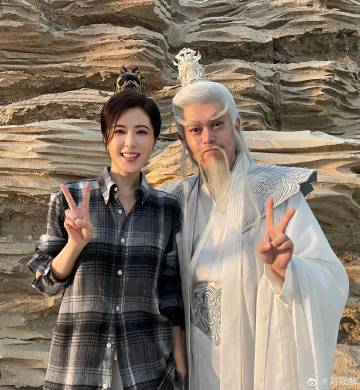 | 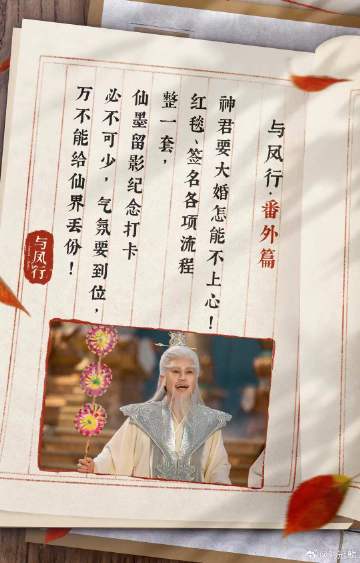 |
On April 11-12, Liu Guanlin posted two pictures to conclude : "busy with wedding preparations", and "blessings from the Heavenly Emperor".
Haveninmuse 37 minutes ago
For anyone interested! There is a fan made analysis video: "When do you think Xing Zhi first fell for Shen Li?" https://video.weibo.com/show?fid=1034:5029212491546660
Translations below under spoilers.
1 Reply
Haveninmuse 33 minutes ago
Hide SpoilerWhen do you think XZ fell for SL? In fact, from their very first meeting (as human form), XZ did not "fall in love at first sight". SL has never been a "likeable" girl that people would want to confess to and bring home as a wife.
FRJ: “Who would want to marry this kind of feisty warrior woman as a wife? She does not have any bit of vulnerable charm for anyone to pity her.” In FRJ's eyes, although SL is beautiful, she is like a rose with thorns, prickly woman no one wants.
XZ: “She has.” Only XZ will deny this and want to pity/care for her.
When XZ first met SL, he treated her as a pet, to tease for fun. The first time changing his view of her, would be when she assists during the ghost soldier and his wife. She has a small petite body, but would push XZ behind her to protect him. In XZ's 10,000+ years of life, no one has ever given him this feeling of protection. In this scene, he cannot stop looking at SL many times in a new light.
When he fell into the lake, he even waits for SL to save him (smiling), to experience the protection again.
XZ: "Who saves someone by pulling hair?!" Frustrated, but playful.
SL: "Now that I'm human again, I will leave." You can see XZ's look of sadness, as the warmth and fun he felt is about to leave. When she then turns back into a chicken, you can see his emotions change to happiness immediately, even laughing again.
If not for the bad guys coming, XZ would not want to move the stone and let SL regain her human body. Because XZ knowing this would cause her to leave, so he becomes like a naughty child, faking pain, fussing, and attracting attention. Although SL doesn't treat him with tender care, she is still showing softness and pity when she read his leaf of his tragic past, and it made him happy. In the kitchen, both touched accidentally and become embarrassed. This might be when SL is the most feminine, blushing red, and XZ's ears redden and he stutters.
When SL confesses that she likes him, his first reaction was a smile, but it changes to sad, and then a fake smile and "got it". Seems like he was happy, but knowing there is no future, gives her "an answer that is not an answer". He might like her, but cannot like her.
SL: I've spent more time with him (Mofang) than with you.
XZ: *sad face* (A reminder that separation is inevitable; they belong to different worlds.)
XZ gifts SL a poisonous arrow hairpin. In ancient times, hairpins are usually tokens of love and gifted to lovers. "Sturdy, lethal, but dazzles beautifully." This is how XZ sees SL, and the reason he fell for her: She is the light that has brighten up his gloomy lonely days.
Recent Discussions
-
Queen Dowager and the royal family tree14 minutes ago - Lilybilly
-
Xiang Liu and Xiao Yao’s Story and Romance22 minutes ago - liddi
-
University Dramas27 minutes ago - emeraldarrows
-
Error messages when submitting comments, messages etc.31 minutes ago - JulyMoon
-
BL Drama Lovers Club33 minutes ago - American Fan
-
Last Japanese song you listened to? #257 minutes ago - Anusaya
-
help find a drama57 minutes ago - flamingo
-
A moment but forever (xianxia)- ALL TRAILERS1 hour ago - eliteles1
Hottest Discussions
-
♥️Count to 7000000♥️2 hours ago
-
♡Last letter of a country / town game♡2 hours ago
-
10 dramas/movies with ____? #45 hours ago
-
✰ Last letter food game ✰2 hours ago
-
Word Association #42 hours ago
-
Just Name IT5 hours ago


